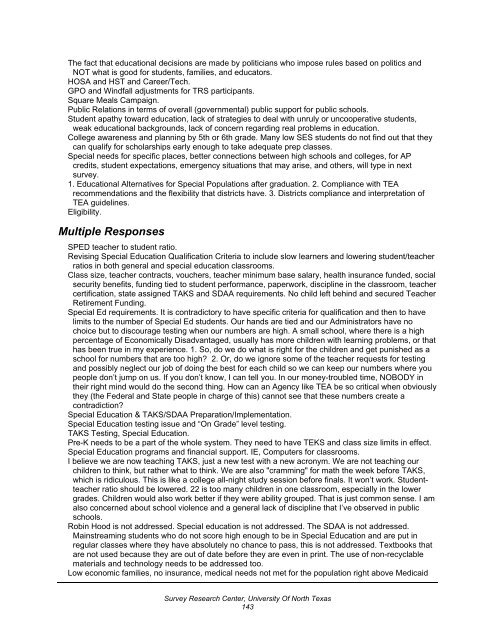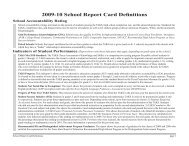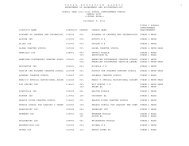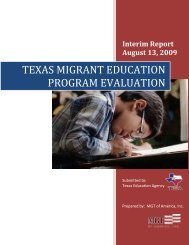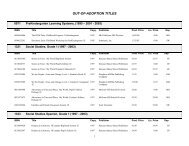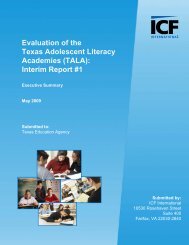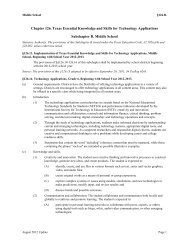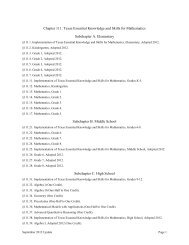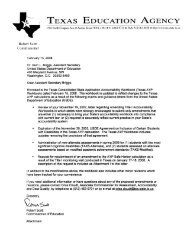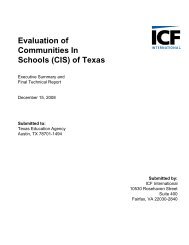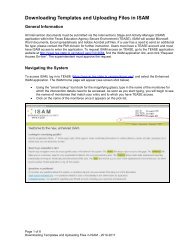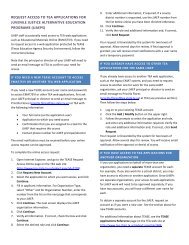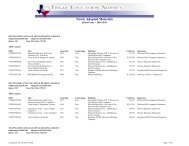2004 Customer Satisfaction Survey (PDF, 566 KB) - TEA - Home ...
2004 Customer Satisfaction Survey (PDF, 566 KB) - TEA - Home ...
2004 Customer Satisfaction Survey (PDF, 566 KB) - TEA - Home ...
Create successful ePaper yourself
Turn your PDF publications into a flip-book with our unique Google optimized e-Paper software.
The fact that educational decisions are made by politicians who impose rules based on politics and<br />
NOT what is good for students, families, and educators.<br />
HOSA and HST and Career/Tech.<br />
GPO and Windfall adjustments for TRS participants.<br />
Square Meals Campaign.<br />
Public Relations in terms of overall (governmental) public support for public schools.<br />
Student apathy toward education, lack of strategies to deal with unruly or uncooperative students,<br />
weak educational backgrounds, lack of concern regarding real problems in education.<br />
College awareness and planning by 5th or 6th grade. Many low SES students do not find out that they<br />
can qualify for scholarships early enough to take adequate prep classes.<br />
Special needs for specific places, better connections between high schools and colleges, for AP<br />
credits, student expectations, emergency situations that may arise, and others, will type in next<br />
survey.<br />
1. Educational Alternatives for Special Populations after graduation. 2. Compliance with <strong>TEA</strong><br />
recommendations and the flexibility that districts have. 3. Districts compliance and interpretation of<br />
<strong>TEA</strong> guidelines.<br />
Eligibility.<br />
Multiple Responses<br />
SPED teacher to student ratio.<br />
Revising Special Education Qualification Criteria to include slow learners and lowering student/teacher<br />
ratios in both general and special education classrooms.<br />
Class size, teacher contracts, vouchers, teacher minimum base salary, health insurance funded, social<br />
security benefits, funding tied to student performance, paperwork, discipline in the classroom, teacher<br />
certification, state assigned TAKS and SDAA requirements. No child left behind and secured Teacher<br />
Retirement Funding.<br />
Special Ed requirements. It is contradictory to have specific criteria for qualification and then to have<br />
limits to the number of Special Ed students. Our hands are tied and our Administrators have no<br />
choice but to discourage testing when our numbers are high. A small school, where there is a high<br />
percentage of Economically Disadvantaged, usually has more children with learning problems, or that<br />
has been true in my experience. 1. So, do we do what is right for the children and get punished as a<br />
school for numbers that are too high? 2. Or, do we ignore some of the teacher requests for testing<br />
and possibly neglect our job of doing the best for each child so we can keep our numbers where you<br />
people don’t jump on us. If you don’t know, I can tell you. In our money-troubled time, NOBODY in<br />
their right mind would do the second thing. How can an Agency like <strong>TEA</strong> be so critical when obviously<br />
they (the Federal and State people in charge of this) cannot see that these numbers create a<br />
contradiction?<br />
Special Education & TAKS/SDAA Preparation/Implementation.<br />
Special Education testing issue and “On Grade” level testing.<br />
TAKS Testing, Special Education.<br />
Pre-K needs to be a part of the whole system. They need to have TEKS and class size limits in effect.<br />
Special Education programs and financial support. IE, Computers for classrooms.<br />
I believe we are now teaching TAKS, just a new test with a new acronym. We are not teaching our<br />
children to think, but rather what to think. We are also "cramming" for math the week before TAKS,<br />
which is ridiculous. This is like a college all-night study session before finals. It won’t work. Studentteacher<br />
ratio should be lowered. 22 is too many children in one classroom, especially in the lower<br />
grades. Children would also work better if they were ability grouped. That is just common sense. I am<br />
also concerned about school violence and a general lack of discipline that I’ve observed in public<br />
schools.<br />
Robin Hood is not addressed. Special education is not addressed. The SDAA is not addressed.<br />
Mainstreaming students who do not score high enough to be in Special Education and are put in<br />
regular classes where they have absolutely no chance to pass, this is not addressed. Textbooks that<br />
are not used because they are out of date before they are even in print. The use of non-recyclable<br />
materials and technology needs to be addressed too.<br />
Low economic families, no insurance, medical needs not met for the population right above Medicaid<br />
<strong>Survey</strong> Research Center, University Of North Texas<br />
143


